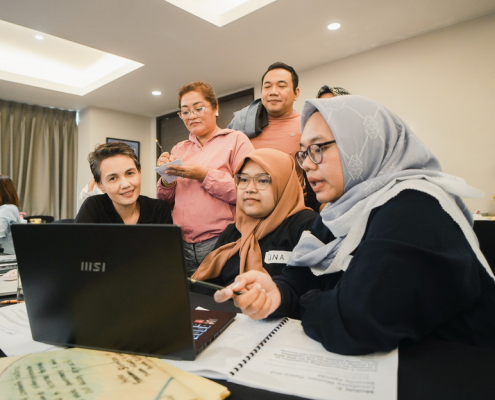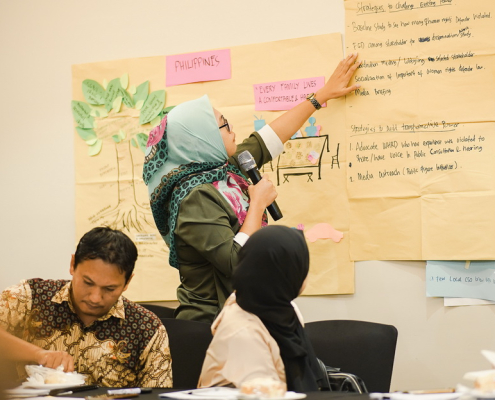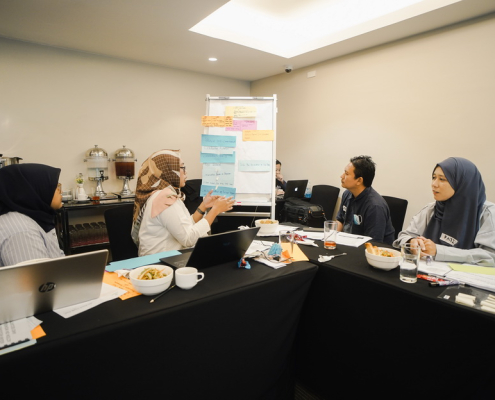KEIKUTSERTAAN EMPATIKU DALAM PELATIHAN TOT MEMBANGUN KAPASITAS UNTUK REINTEGRASI SOSIAL
.
Ardhiana Fitriyanie Program Manager Yayasan Empatiku menghadari undangan pelatihan dari The Habibe Center pada tanggal 21-23 Februari 2024 di Four Points by Sheraton di Jakarta.
Acara ini memiliki tiga tujuan diantaranya adalah meningkatkan kemampuan trainers untuk memberikan pelatihan keterampilan dan pengetahuan untuk diberikan kepada ex-napiter, kemudian memberikan keterampilan untuk proses reintegrasi sosial serta dapat mengidentifikasi potensi kolobarsi antar stake-holders. Acara yang berlangsung selama tiga hari ini sangat menyenangkan dan peserta yang lebih dari 15 orang hadir datang dari berbagai lembaga diantaranya adalah dari lapisan organisasi masyarakat sipil seperti YPP, Infid, Search for Common Ground, Wahid Foundation, CDS, DASPR, FKAAI, dll. Sedangkan dari pihak instansi pemerintahan ada Kemenag, BNPT, Sentra Handayani, Densus 88 AT, Kejaksaan Agung hingga Ditjenpas.
Dinamika pelatihan ToT ini sangat menarik, peserta tidak lagi disuguhi pembekalan materi secara sepihak oleh tim THC saja, namun semua peserta diminta berkelompok dan kelompok yang terpilih harus membawakan 2-3 sesi sedangkan kelompok yang tidak mendapatkan giliran akan berperan sebagai peserta pelatihan. Dinamika ini sangat unik dan menarik, karena setiap kelompok diberikan ruang seluas-luasnya dalam membawakan sesi materi sesuai dengan rencana yang sudah disiapkan oleh para kelompok yang mendapat giliran. Sehingga metode yang disampaikan setiap kelompok dapat berbeda satu dengan lainnya. Setiap kelompok tetap akan mengikuti guildeline dari modul yang sudah diberikan oleh THC namun, bagaimana dan metode apa yang digunakan serta tambahan ice breaking atau games diserahkan sepenuhnya pada masing-masing kelompok.
Metode ini berhasil memecah kebosanan dan dapat diikuti dengan baik oleh para peserta lain, sehingga para peserta yang lembaganya sudah terbiasa melakukan pelatihan kepada mitranya di lapangan dapat memperkaya wawasan dan metode pelatihan. Sedangkan lembaga yang belum pernah melakukan pelatihan dapat benar-benar belajar cara pelatihan yang fun dan tidak membosankan ketika suatu saat mereka menpatkan tugas pelatihan di lembaga masing-masing.
Modul Pelatihan Reintegrasi pendekatan Psikososial ini memiliki materi yang umum yang diperuntukan untuk conflict transformation dengan berbagai isu. Secara keseluruhan materi dalam modul ini berisi tentang Identitas Diri, Perubahan Nilai, Apresiasi, Pemimpin & Pengikut, In Group & Out Group yang mana modul ini juga sangat relevan dalam reinegrasi bagi mantan narapidana terorisme yang memiliki kesulitan untuk kembali ke masyarakat karena masih belum lepas dari kelompok radikal sebelumnya.
Empatiku melihat bahwa penggunaan modul ini bisa sangat bersinergi dengan pedoman milik Empatiku yaitu Mengenal Tanda Peringatan Dini Esktremisme Kekerasan yang sudah di launching maret tahun lalu dimana pedoman ini diperuntukan untuk masyarakat agar dapat berperan aktif dalam pencegahan eksterisme berbasasi kekerasan mengarah pada terorisme dengan mampu mengenal tanda-tanda peringatannya sedini mungkin dan dapat membantu para ex-napiter untuk dapat kembali ke masyarakat. Keterkaitannya adalah sebelum mereka (ex-napiter) dapat reintegrasi ke masyarakat, warga disekitar rumahnya nanti sudah dipersiapakan dan dibekali daya tangguh dalam melawan potensi ekstremisme di lingkungan mereka dengan menggunakan berbagai prinsip dasar dalam pedoman ini diantaranya Prinsip Do No Harm, Kehati-hatian, Perlindungan HAM, Kesetaraan, Perlindungan Anak, Kesetaraan Gender, serta prinsip lainnya. Sehingga masyarakat sudah tidak ada lagi memberikan stigma dan labelisasi untuk mereka sehingga dengan penerimaan masyarakat di sekitarnya mereka mampu memisahkan diri dari kelompok lamanya (Disengagement) karena mendapat penerima dari lingkungan baru mereka dan mulai membangun kohesi sosial bersama.


 This workshop consisted of two sessions and was facilitated by Maricel Aguilar. The first session discussed ‘Introduction to Gender and Peace’ which included issues of gender and sex dichotomy, protection against gender-based discrimination and violence, and human security. Then, the second session talked about ‘Gender Issues and The Role of Social Institutions’ and its relation to the impact of a gender perspective in social institutions. It contains how the dimensions of gender, issues of patriarchy and transformative masculinity affect interpersonal, internal, institutional and ideological. The online workshop session was closed with a discussion on women’s rights and gender equality in Southeast Asia and the role of the government in each country in responding to this issue.
This workshop consisted of two sessions and was facilitated by Maricel Aguilar. The first session discussed ‘Introduction to Gender and Peace’ which included issues of gender and sex dichotomy, protection against gender-based discrimination and violence, and human security. Then, the second session talked about ‘Gender Issues and The Role of Social Institutions’ and its relation to the impact of a gender perspective in social institutions. It contains how the dimensions of gender, issues of patriarchy and transformative masculinity affect interpersonal, internal, institutional and ideological. The online workshop session was closed with a discussion on women’s rights and gender equality in Southeast Asia and the role of the government in each country in responding to this issue. From these activities, the participants were able to map the challenges, opportunities and implementation of women’s issues and peace. Apart from that, it also discussed the efforts of each country to advocate for gender issues in peace building. Pipit also stated that from this workshop, he could increase his knowledge of the International Legal Framework (UNSC 1325) and the Regional Framework (ASEAN RAP on WPS) and reflect on the current legal framework in Indonesia.
From these activities, the participants were able to map the challenges, opportunities and implementation of women’s issues and peace. Apart from that, it also discussed the efforts of each country to advocate for gender issues in peace building. Pipit also stated that from this workshop, he could increase his knowledge of the International Legal Framework (UNSC 1325) and the Regional Framework (ASEAN RAP on WPS) and reflect on the current legal framework in Indonesia. EMPATIKU works to innovate learning processes and transform institutional systems to foster people’s emotional competence and instill empathy.
EMPATIKU works to innovate learning processes and transform institutional systems to foster people’s emotional competence and instill empathy.